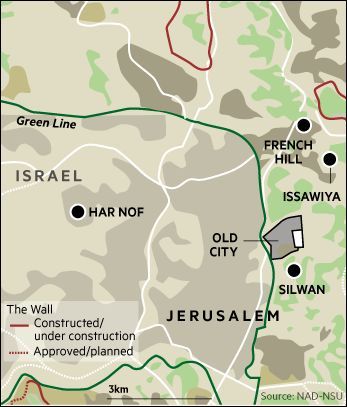A feature article in the Financial Times (accessible through Google News) by John Reed on tensions within Jerusalem is full of bias that seems to indicate that Reed has fully adopted the Palestinian narrative and terminology.
Reed writes:
Visits in the autumn by rightwing Jewish politicians and activists to Haram al-Sharif — site of the Muslim al-Aqsa mosque and known to Israelis as Temple Mount — have upset Palestinians, who were also angered by the summer’s Israeli military campaign in the Gaza Strip and a breakdown of Israeli-Palestinian political relations after the collapse of peace talks.
He fails to acknowledge the importance of the Temple Mount as Judaism’s holiest site, instead prioritizing the Muslim name for the site. He repeats this later in the article where he refers to:
some Israeli rightwingers’ demands for the right to pray at al-Aqsa, Islam’s third-holiest site, and a place reserved for Muslim worship since Israel occupied East Jerusalem during the six-day war.
Reed even acknowledges that al-Aqsa is Islam’s third-holiest site yet there is still no acknowledgment of the Temple Mount’s status for Jews. In addition, no Jews have demanded the right to pray “at al-Aqsa.” After all, why would a Jew wish to pray in a mosque? Rather, some Jews wish to pray on the Temple Mount compound without interfering with existing Muslim holy sites or prayer arrangements.
Reed then quotes a Palestinian woman who says:
“We don’t enter the Western Wall” — the place where Jews pray — she says, and Jews should not enter what she calls “a holy Muslim, Palestinian site.”
Reed has ignored the fact that freedom of worship is enshrined in Israeli law. Therefore, there is nothing to prevent any Arabs, non-Jews or any other religion from visiting any holy sites in Jerusalem, including the Western Wall. Reed, through portraying the Temple Mount as an exclusively Muslim site has effectively disguised the inherent prejudice expressed by the Palestinian woman as reflected by PA Chairman Mahmoud Abbas who has openly stated that the presence of Jews on the Temple Mount defiles Muslim holy sites.
Regarding Israel’s security barrier, Reed states that:
much of the West Bank [is] sealed off behind Israel’s decade-old security wall.
Considering less than 10% of the barrier is a wall, most of which is a chain-link fence, this is factually inaccurate terminology. But perhaps that isn’t surprising when you examine the source of the accompanying map in the article.
The source “NAD-NSU,” as seen in the bottom right corner of the map, is the PLO’s Negotiations Affairs Department Negotiations Support Unit. Hence the loaded term “The Wall” on the map.
Reed writes about:
the revenge killing of Abu Khdeir, a Palestinian teenager who Jewish youths beat and burnt to death in a tit-for-tat attack on the eve of the Gaza war.
“Tit-for-tat attack?” While the killing of Abu Khdeir was an inexcusable act, Reed has virtually erased the kidnapping and murder of three Israeli teens by Palestinian terrorists that sparked much of the events that followed.
Reed is determined to present Jerusalem as a city divided in every possible way. Yet he refers to “French Hill, an overwhelmingly Jewish neighbourhood” but fails to elaborate. Maybe because this would mean explaining a reality that disturbs Reed’s one-sided framing of the story. The other residents of French Hill are Arabs by virtue of the fact that Palestinian residents of Jerusalem are legally entitled to live anywhere within the city’s municipal boundaries.
Just another inconvenient truth for John Reed that might bring into question his biased view of Jerusalem as narrated by the Palestinians.
Readers of the FT, many of whom support a peaceful resolution to the Arab-Israeli conflict, are left with a severe misunderstanding of the issues when they read articles like this, which ultimately leads to more conflict and misunderstanding.
[sc:graybox ]You can send your considered comments to the Financial Times – [email protected].



